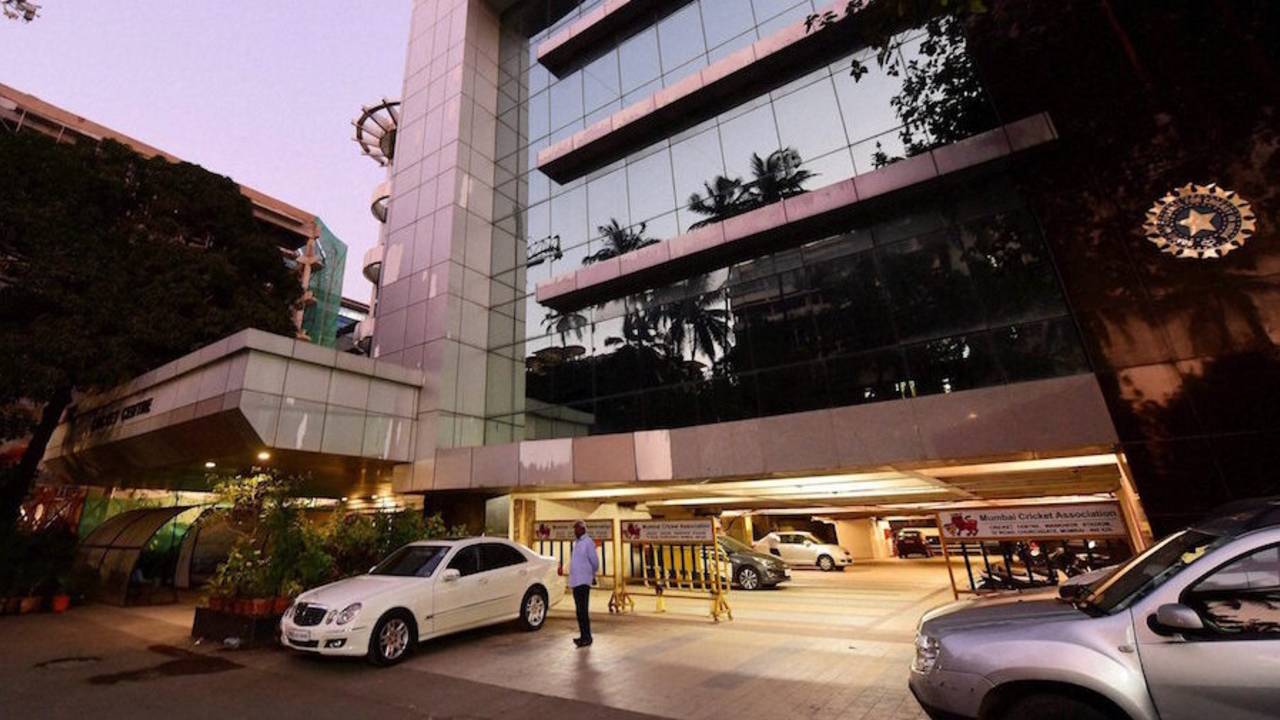Will the Supreme Court end the BCCI's chaos?
A guide to what is expected from Thursday's hearing, which could decide the fate of the board and its state associations, which are yet to fully comply with the Lodha Committee's recommendations
Nagraj Gollapudi
16-Jan-2019
A view of the BCCI headquarters at Wankhede Stadium • PTI
On Thursday, the Supreme Court will reconvene to hear the longstanding case related to the BCCI. The most important point on the agenda is the status report submitted last October by the Committee of Administrators (CoA) asking the court to bar voting rights of non-compliant states and finalising a timeline for BCCI to conduct elections within a set timeframe. Here's a guide to what is expected at the hearing, which is scheduled to begin at 3 pm.
Why is this hearing significant?
This hearing has the potential to end the bizarre situation where the BCCI has not carried out the Supreme Court's orders on reforms. On July 18, 2016, the court approved the reforms recommended by the RM Lodha Committee and directed that they be implemented by all state associations; it subsequently amended certain reforms at the request of several state associations. To date, though, not a single member association of the BCCI, nor the parent body itself, has implemented the recommendations in toto.
The CoA has now recommended that the BCCI conduct elections within 90 days from the court's ruling and has requested, in its status report, that the court approve a timeline for elections.
Why has the BCCI failed to hold elections?
To conduct the elections, the states and the BCCI first need to comply with the new constitution, which was registered last August. That means they have to agree unconditionally to all reforms. Not one of the 34 state associations of the BCCI was fully compliant at the time when the CoA submitted its status report on October 27 last year. The CoA identified seven states as being "non-compliant", while the rest fell under the "partially compliant" and "substantially compliant" categories.
What are the contentious reforms?
Although the state associations have set the ball rolling, many have dragged their feet on key reforms such as the cooling-off period, disqualification criteria, and selection panels. The most significant reform that BCCI members want the court to re-examine is the nine-year tenure limit set for office bearers in the new constitution. The members have suggested that as per the original order of the court in 2016, the office bearers' tenure at BCCI and state associations was distinct, giving office-bearers a potential cumulative life of 18 years. However, under the new constitution, that limit has been reset to a cumulative nine years - whether at state level or at the BCCI or both.
What can the court do to enforce its order?
Follow the CoA's recommendation of barring errant state associations from their voting rights in the BCCI elections and also withholding their funding.

Diana Edulji and Vinod Rai emerge from a CoA meeting•Getty Images
Anything else the BCCI members want to pursue?
Several BCCI members want the CoA's reign to be brought to end. But that will only happen if they conduct elections. Nonetheless, the members want to make the court aware of the deep divisions and distrust within the two-member CoA comprising Vinod Rai, the former Comptroller & Auditor General of India, and Diana Edulji, the former India women captain. Their motive? Some members feel that would allow them to regain control of the BCCI despite being forced to implement reforms unconditionally.
The issues that have split the CoA
The Rahul Johri sexual-harrassment allegations
The hiring of the India women coach
The Hardik Pandya-KL Rahul chat show controversy
The Rahul Johri sexual-harrassment allegations
The hiring of the India women coach
The Hardik Pandya-KL Rahul chat show controversy
How does the divide in CoA really matter?
It matters because the CoA's squabbles have now spilled over to the cricket arena and are in danger of affecting India's World Cup preparations. Take the controversial TV-show comments of Hardik Pandya and KL Rahul: Rai and Edulji agree the players ought to be penalised, but have differed strongly on how to go about it. Both players have now been suspended and are out of the ongoing ODI series in Australia and are set to miss the limited-overs tour of New Zealand as well. The BCCI's legal team recommended that the players be suspended pending an inquiry with the Ombudsman being the final adjudicator. Both Rai and Edulji want the court to give directions on the appointment of an Ombudsman, a position the BCCI has not filled since late 2016.
Any other matter of interest?
The court is also likely to hear a petition, filed by whistleblower Aditya Verma, to make public the findings of the ad-hoc committee that handled the sexual misconduct allegations against BCCI CEO Rahul Johri. The CoA will submit the findings in a sealed envelope but Verma has petitioned the court to ask the CoA to make the findings public.
And, finally, who is conducting the hearing?
At least three chief justices have presided over the case stretching back five years. On Thursday the bench will comprise Justices SA Bobde and AM Sapre.
Nagraj Gollapudi is a deputy editor at ESPNcricinfo
